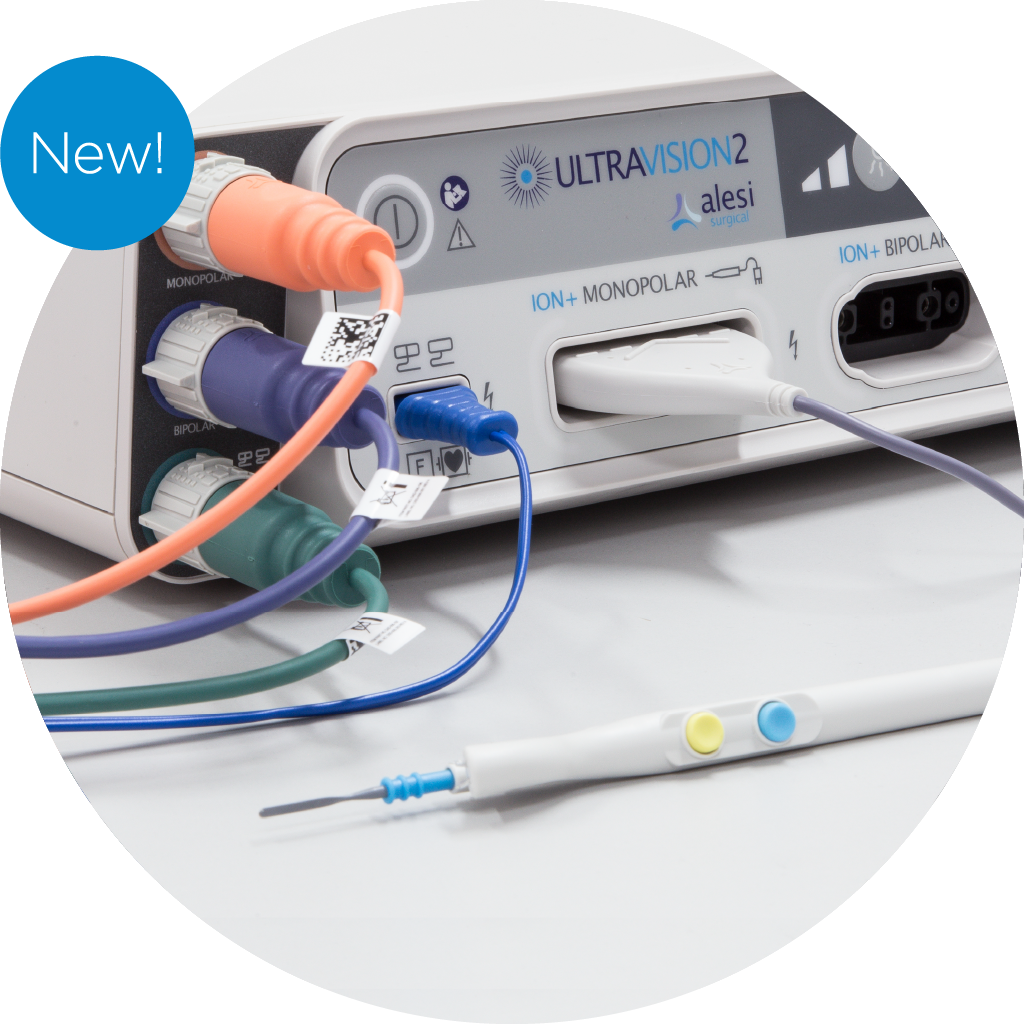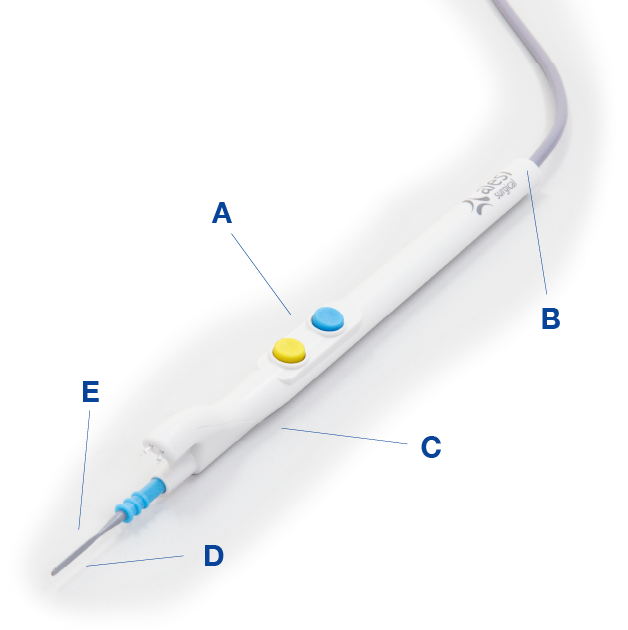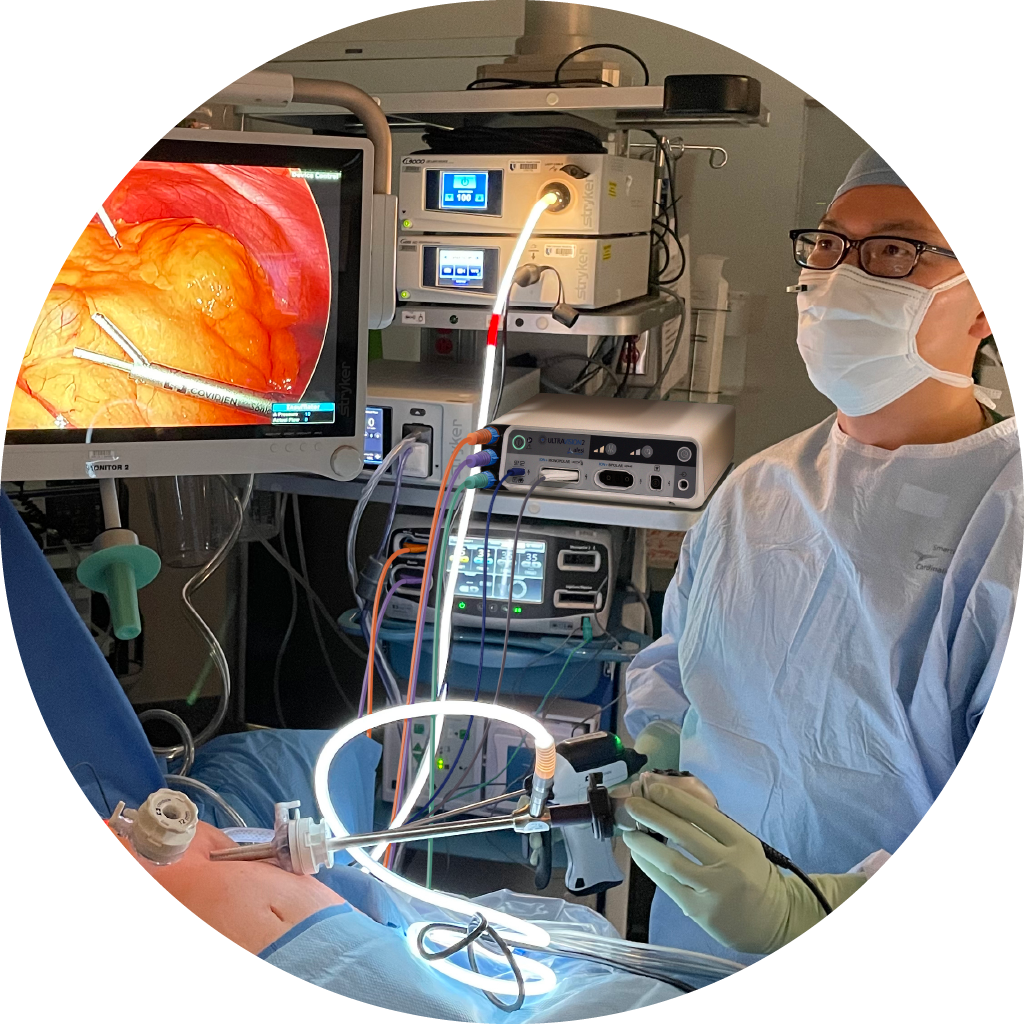Why Choose Ultravision
For Open Surgery?

Ultravision2™ provides advanced smoke management for OR staff with the new IonPencil for use in open surgery.
The IonPencil suppresses aerosolization of the surgical smoke at the source, minimizing its release into the operating room. The slimline ergonomic design provides an unshrouded electrode tip, enabling excellent operative site access, and the lack of tubing ensures minimal torque and drag. The efficient design also improves sustainability with reduced packaging, smaller product, and no disposable filters.
The silent Ultravision2 generator helps ensure OR staff can concentrate on the patient, with minimal distractions.

The IonPencil
The IonPencil has been developed to provide excellent smoke management performance but without any of the bulk associated with conventional "smoke pencils" that can compromise surgical performance.
A - Slimline handle.
B - No tubing.
C - Reduced weight compared to smoke pencil.
D - Unshrouded electrode tip.
E - Easy to handle, greater tissue access.
Benefits to Ultravision Stakeholders
Overview of Benefits
Performance – Cut / Coag
- Equivalent to a diathermy pencil
Performance – smoke management
- Equivalent particulate performance versus smoke evacuator pencil
- Large VOC margin of safety relative to NIOSH/OSHA limits
- Less smell reported in the OR*
- Reduces infectivity of precipitated viruses
Ergonomics
- Silent in operation vs smoke evac
- No tubing required
*compared to smoke evacuator at 50% power setting
Ergonomics (Continued)
- Lighter than smoke pencil
- Less volume, width and depth than smoke pencil
- Less torque and drag than smoke pencil
- Unshrouded electrode tip
- Better access to surgical site than smoke pencil
Environmental
- Reduced waste versus smoke pencil - packaging (volume and mass)
- Reduced waste versus smoke pencil - device (volume and mass)
- No disposable filters versus smoke pencil
- Contributes to sustainability KPIs
Ultravision Performance Comparison...
| Product Type | IonPencil™ | Telescopic Smoke Pencil | Non-Telescopic Smoke Pencil |
|---|---|---|---|
| Best-in-class operative site access | |||
| High maneuverability | |||
| Silent in operation | |||
| High energy efficiency | |||
| Low environmental impact |
What the surgeons say

Want to see more? Ultravision in use
Watch a range of videos to see Ultravision in action. Our footage features a range of live cases across various specialties.

Want to read more? Download our brochures
Our product brochures are available to download in ready to print format for both open and laparascopic products.
Questions and Answers
Ultravision2 delivers a maximum of 0.2W to the patient. This is 200x less power than a monopolar instrument set at 40W.
The low output also means UV2 uses at least 15 times less power than a smoke evacuation system
A smoke evacuator relies on a vacuum pump to pull CO2 through a filter.
The smoke evacuator is noisy and distracting; the tubing is cumbersome and inconvenient.
It dramatically increases patient CO2 exposure and results in unstable pneumo.
If it is too aggressive, tissue can be sucked up the trocar and potentially damaged.
The IonPencil consumable is lighter than a smoke pencil, has no plastic hosing, and requires less packaging (1). Being non-vacuum based it does not require a filter cartridge, which is also a disposable item required for a smoke evacuator. The Ultravision2 generator also consumes up to 15 times less power than a smoke evacuator and up to 37 times less power than an advanced insufflator in operation (2). This reduces hospital biohazard waste for incineration or landfill and less energy is consumed by the hospital in providing smoke management for its employees.
Ultravision2 maximum energy consumption is 27W; representative smoke evacuator maximum energy consumption is 398W (VisiClear, ConMed Corp); representative advanced insufflator is 874W (AirSeal, ConMed Corp). Source – Alesi Surgical, data on file.
*UV2 27W is at 100% dual emitter, Smoke evac 398W is Buffalo, 874W is Airseal (peak for both)
The rate of adoption of surgical smoke legislation is accelerating as the short- and long-term exposure risks become better understood. In 2018, only 1 state had enacted legislation. Just six years later and now over twenty states have either enacted, or are in the process of enacting, legislation mandating the use of smoke management products in the OR.
As of July 2024, 18 states have enacted legislation requiring hospitals to provide surgical smoke management equipment, with a further four pending.
The AORN organization is the best way to track progress, which has accelerated dramatically since the Covid pandemic:
https://www.aorn.org/get-involved/government-affairs/policy-agenda/surgical-smoke-free-or/smoke-bills
In Europe, EORNA (https://eorna.eu/) is proactively lobbying for similar legislation to be introduced in Europe.
